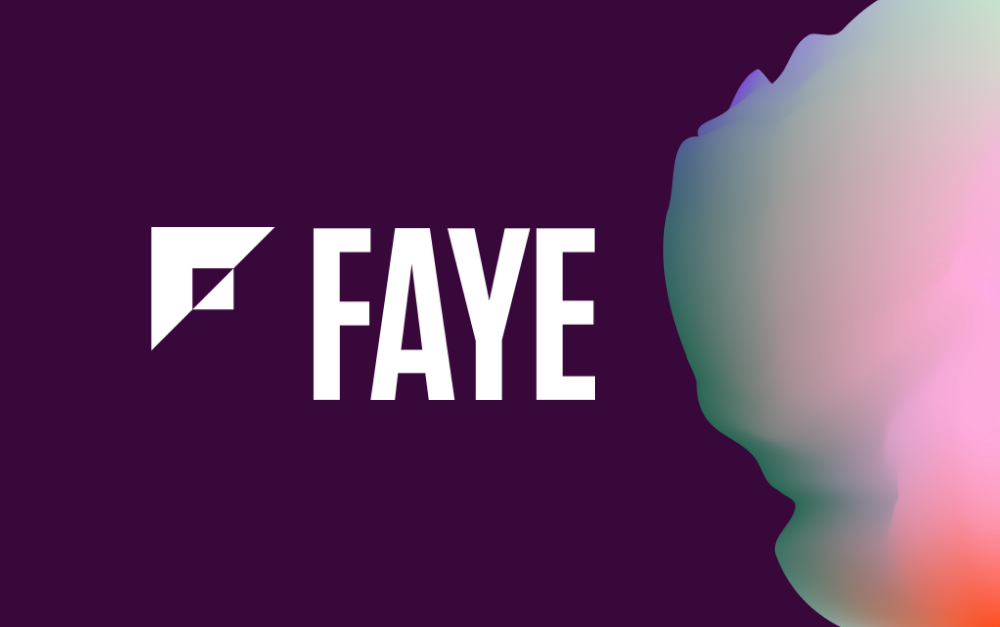
Customer relationship management (CRM) can produce a significant return on investment over time. However, your organization must have a complete understanding of all CRM implementation costs.
There are five key stages that you need to consider when breaking down the cost of a CRM implementation. They are the planning, development, implementation, training, and support stages.
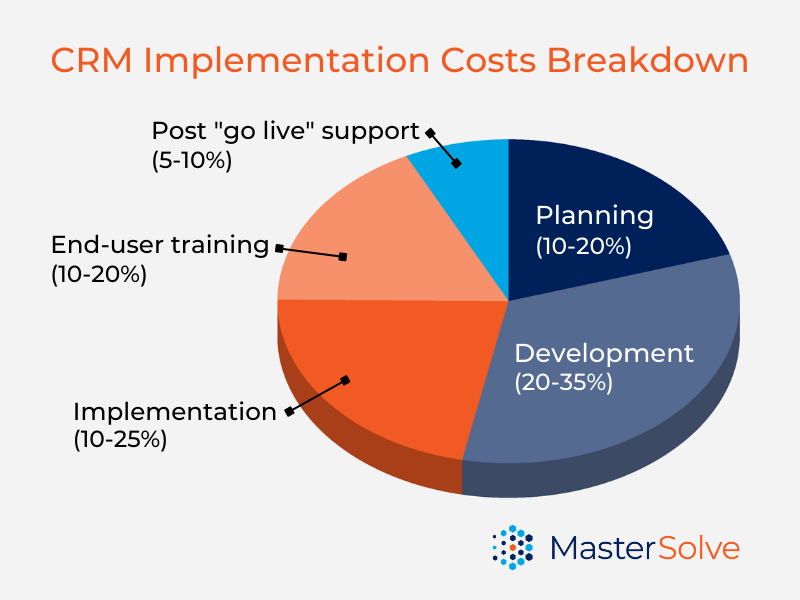
To make this easier to understand, we’ll walk through a scenario with a fictional organization called “Company A.” Company A is a mid-sized enterprise with 20 CRM users. Let’s see what costs they need to consider when going through each of these stages.
CRM Planning Stage: Opportunity Costs Explained
Every project starts with the initial plan. It is crucial for your managers, key stakeholders, and employees to define the company vision and what tasks will be performed and simplified by the CRM in this stage.
Before we start talking numbers, it’s important to note that the costs in this stage are only opportunity costs. Companies do not spend additional money in this step, and thus we will not include it in the overall implementation costs equation.
When it comes to Company A, we have provided an example list of actions they might take during this stage.
Planning stage tasks:
- The sales manager, with help from their sales reps, the marketing team, and the support team, will create a CRM business case for the executive leadership team to review
- The executive leadership team will review and approve the CRM business case
- The sales manager will create a project budget, determine timelines, and define the project scope
- The executive leadership team will review and approve the project budget, timeline, and scope
- The sales manager, with help from their sales reps, the marketing team, and the support team, will research CRM solutions, compare their top three CRM system choices by conducting a CRM vendor evaluation, and share their final list of CRM candidates for the executive leadership team to review
- The executive leadership team will compare the shortlist of CRM options and help the sales leader in selecting which vendor to move forward with
For an organization like Company A, these tasks might take a combined total of around 100 hours to complete—this time is spent by members of the sales, marketing, support, and leadership teams.
*Please note that the hours needed to complete the above tasks will vary significantly from organization to organization, depending on various factors.
Company A can evaluate their opportunity costs in this stage by calculating the hourly salary for the employees involved in each step and multiplying that by the number of hours it takes to complete that step.
Let’s assume that the average salary of all of the planning team members is $50 per hour. This would equal an opportunity cost of $5,000.
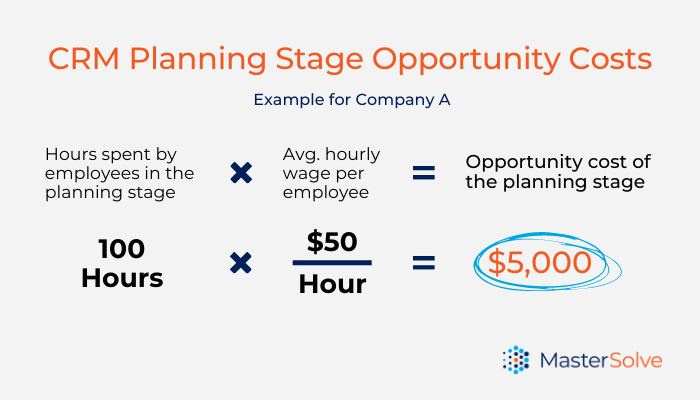
Remember, Company A would not spend additional money for this step. Since the planning stage is all internal research, we will not be adding it to determine the final implementation costs.
CRM implementation cost subtotal for Company A = $0
CRM Development Costs
The next step in the CRM implementation process is the development stage. In this stage, you have already identified which CRM vendor you will move forward with, and you are ready to create your CRM implementation plan.
This step typically takes up a more significant chunk of the budget and is one of the most prolonged phases of a successful CRM implementation.
Company A does not have the internal resources or the proper knowledge to handle development tasks, so they will hire an outsourced CRM consultant. This outsourced consultant will be responsible for not only the development of the CRM but also the implementation.
Development tasks to be completed by the consultant:
- Determine what fields are required for the CRM to monitor business processes and goals
- Plan necessary follow-up workflows on tasks, including automated or manually generated reminders
- Define what custom reports and dashboards will be needed
- Map out security and compliance concerns
- Set a final timeline and budget expectations
- Discuss necessary CRM integrations for increased productivity
- Develop post-implementation training schedule and CRM go-live expectations
Company A has met with their CRM consultant and determined that they will need 45 hours of development work. The average cost of an outsourced CRM consultant is around $180 per hour. Assuming these numbers, Company A can expect a total cost of $8,100 for the CRM development stage.
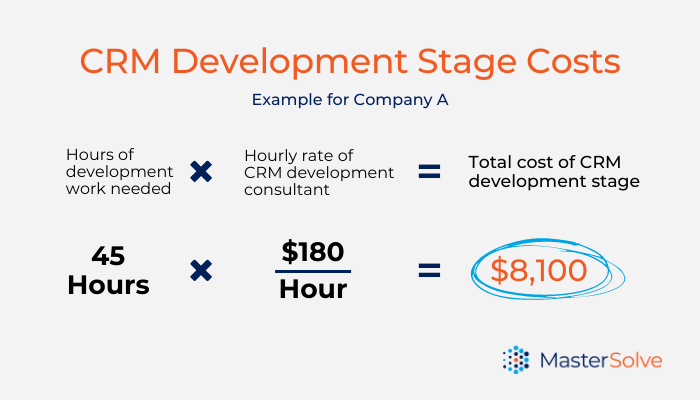
*Note that the number of hours needed to complete the tasks above and the price per consultant will vary significantly between organizations and from consultant to consultant, depending on various factors.
Development stage cost for Company A = $8,100
CRM implementation cost subtotal for Company A = $8,100
CRM Implementation Costs
In the CRM Implementation stage, you will finally put your development work into practice by implementing and going live with your CRM system.
The process of CRM implementation includes the following aspects:
- Testing: Identifying bugs, fixing bugs, running quality assurance (Q.A.) programs, testing UX (user experience) and U.I. (user interface), and more
- Data migration (if necessary): This step is all about transferring core information from old, redundant systems to new and advanced systems
- Connecting: Making sure that all applications and integrations are working seamlessly
- Launching: Deactivating the legacy system and beginning to use the new systems
Company A has met with their CRM consultant and determined that they will need 30 hours for implementation. Again, we will assume that Company A will pay the consultant $180 per hour. This means the total for the implementation stage will be $5,400.
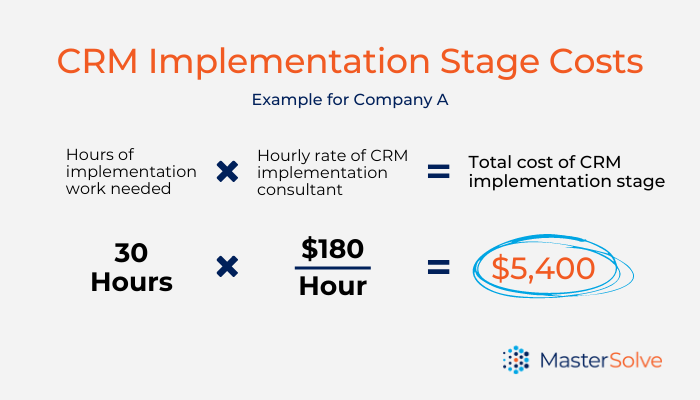
*The number of hours needed to complete these tasks and the price per consultant will vary significantly between organizations and from consultant to consultant, depending on various factors.
Implementation stage cost for Company A = $5,400
CRM implementation cost subtotal for Company A = $13,500
End-User Training Costs
More often than not, managers forget to take care of the most critical stage of a CRM implementation: training employees to use it correctly.
This stage can be challenging because some employees may hesitate to accept the positive changes that the new CRM will bring by assuming it may endanger their job or add more tasks to their daily activities.
This is why you should be proactive and purchase CRM training from your vendor or a third-party consultant to achieve higher user adoption.
On average, an organization should plan for anywhere from 24-48 hours for end-user CRM training.
Company A will provide its end-users with 24 hours of training at $180 per hour. They can estimate about $4,320 total in costs for the training stage.
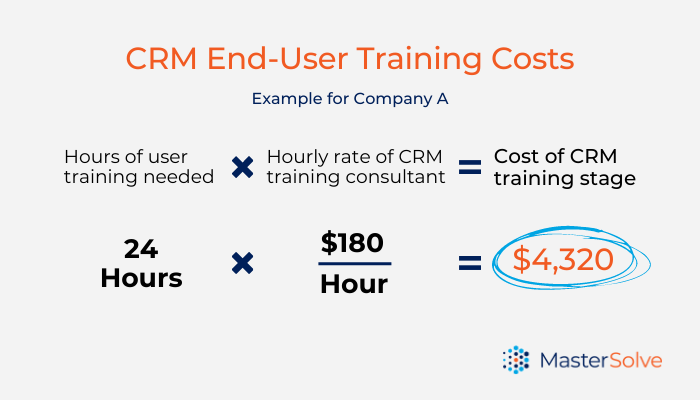
*Please note that the number of training hours needed and the price per training will vary significantly from organization to organization and from consultant to consultant, depending on various factors.
CRM training cost for Company A = $4,320
CRM implementation cost subtotal for Company A = $17,820
Costs of CRM Support After “Go-Live”
Your systems and apps may be up-to-date when you first implement your CRM, but they will evolve over time. Plus, you should be prepared for unexpected bugs or errors, technology shutdowns, and customers/users who require support.
We recommend getting 5 – 10 hours of consultant support to address these types of issues for the first few weeks after going live. Having these support hours will give you peace of mind that your overall CRM implementation will succeed even if something goes wrong along the way.
Company A will purchase 10 hours of consultant support to use after they go live. If they use the same consultant as before, they can expect to pay $180 per hour. The total cost for post-go-live support will be $1,800.
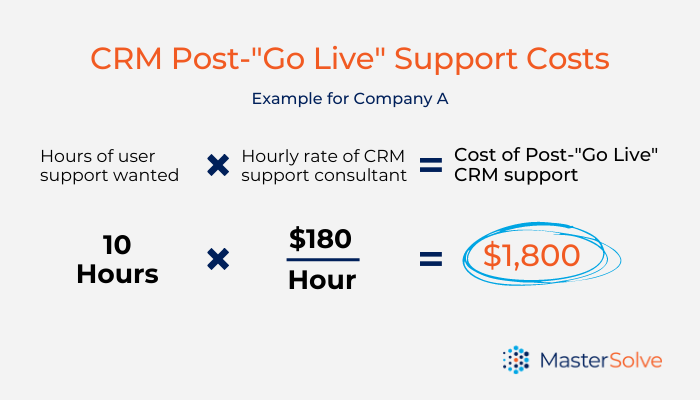
*Please note that the number of post-go-live hours needed and the price of a CRM consultant per hour will vary significantly between organizations and from consultant to consultant, depending on a variety of factors.
Post-Go-Live support cost for Company A = $1,800
CRM implementation cost subtotal for Company A = $19,620
Adding Up CRM Implementation Costs
In conclusion, a mid-sized organization like Company A could expect to pay around $19,620 to implement its CRM system.
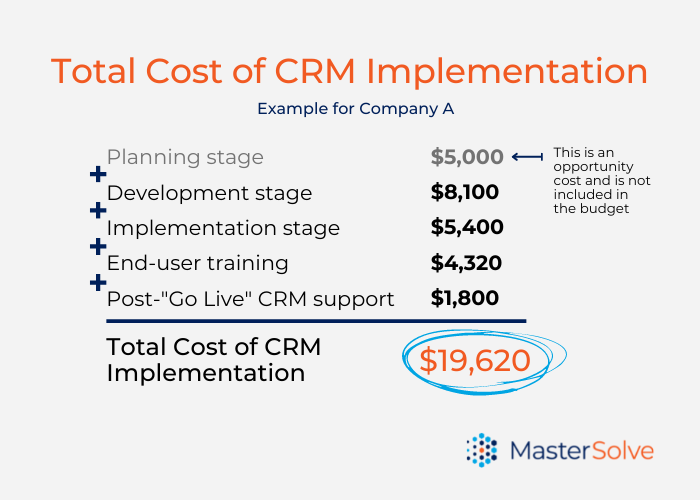
Please note that this was only an example and even organizations that have a similar number of end-users to Company A may have a drastically different implementation cost.
However, this blog is an excellent example of how to map out the total cost of a CRM implementation to help you prepare a budget.
Taking the time to understand your implementation costs and being transparent with your leadership team about those costs will help you deliver a positive return on investment.
Bonus Support Option: S.M.A.R.T. Managed Services
Purchasing support hours for post-go-live is one option. However, we’d like to highlight our own ongoing CRM support subscription, S.M.A.R.T. Managed Services. It is an affordable option to proactively address all of the issues that come with optimizing a CRM–from implementation and beyond.
The cost of S.M.A.R.T. Managed Services varies depending on what CRM you currently use, whether you are migrating to a new system and the amount of CRM users you have on staff. However, you will receive a fixed monthly cost, making budgeting much easier.
Take a few seconds to figure out what your S.M.A.R.T Managed Services costs will be by using our S.M.A.R.T. calculator.

